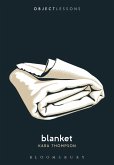Object Lessons is a series of short, beautifully designed books about the hidden lives of ordinary things.
We are born into blankets. They keep us alive and they cover us in death. We pull and tug on blankets to see us through the night or an illness. They shield us in mourning and witness our most intimate pleasures.
Curious, fearless, vulnerable, and critical, Blanket interweaves cultural critique with memoir to cast new light on a ubiquitous object. Kara Thompson reveals blankets everywhere--film, art, geology, disasters, battlefields, resistance, home--and transforms an ordinary thing into a vibrant and vital carrier of stories and secrets, an object of inheritance and belonging, a companion to uncover.
Object Lessons is published in partnership with an essay series in The Atlantic.
We are born into blankets. They keep us alive and they cover us in death. We pull and tug on blankets to see us through the night or an illness. They shield us in mourning and witness our most intimate pleasures.
Curious, fearless, vulnerable, and critical, Blanket interweaves cultural critique with memoir to cast new light on a ubiquitous object. Kara Thompson reveals blankets everywhere--film, art, geology, disasters, battlefields, resistance, home--and transforms an ordinary thing into a vibrant and vital carrier of stories and secrets, an object of inheritance and belonging, a companion to uncover.
Object Lessons is published in partnership with an essay series in The Atlantic.









